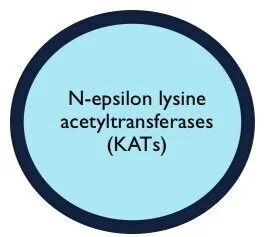N-epsilon lysine acetyltransferases
We study lysine acetyltransferases and how they post-translationally modify a multitude of proteins found within the bacterial cell.
After proteins are made in the cell, they can become what is called post-translationally modified through a variety of different chemical modifications. We are currently studying how bacterial proteins become acetylated by GNATs called N-epsilon lysine acetyltransferases (KATs) and how this differs from chemical (non-enzymatic) acetylation. These modifications occur on a vast number of proteins in the cell and are believed to be critical for regulating cellular processes. However, there is still a lot of debate in the field regarding whether or not these modifications are relevant and/or meaningful. Since these enzymes belong to the GNAT superfamily and are relatives of the very important histone acetyltransferases in eukaryotes, we think the KATs deserve further exploration.

